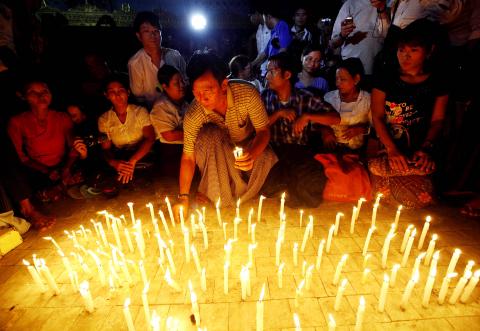Protests against chronic power shortages in Myanmar spread to Yangon late on Tuesday following rallies in the city of Mandalay, which saw several opposition party members briefly held by police.
People are testing the boundaries of their freedom under the quasi-civilian government that took power last year after decades of outright military rule.
Two short but noisy demonstrations involving about 150 people took place in front of Sule Pagoda in the heart of Yangon, the focus of uprisings in 1988 and 2007 that were brutally crushed by the military.

Photo: EPA
Activists and former political prisoners at the second — and larger — of the protests shouted “give us 24-hour electricity” for about 10 minutes before the crowd dispersed at the request of the police.
Myanmar suffers crippling power cuts, with six-hour blackouts commonplace in Yangon and outages three times as long in Mandalay, where about 1,500 people on Monday protested as news of the rallies spread on Facebook.
“We can’t have a good quality of life without electricity, which is the basis for development of the country,” 21-year-old protester Shew Yee said in Yangon.
In Mandalay, about 400 protesters defied a heavy police presence to hold a third straight night of rallies after more than a thousand residents came out on Sunday and Monday, in the nation’s biggest protests since the monk-led 2007 uprising.
Heavy security at the initial rally sites prompted the protest to move to outside a monastery, where monks joined the clamor for an end to the long, rolling blackouts.
Earlier, about 10 members of opposition leader Aung San Suu Kyi’s National League for Democracy (NLD) party were taken for questioning, NLD Member of Parliament from Mandalay Ohn Kyaing said.
“The authorities treated them well and released them afterwards,” he said.
Protests are rare in Myanmar although under a new law, one of a series of reformist moves by Burmese President Thein Sein’s government since the end of army rule, authorized protests have been permitted.
However, the demonstrators in Mandalay did not have approval when they began their rally over the weekend.
Residents accuse the government of failing to provide electricity to its citizens, while selling power to neighboring China.
Only 13 percent of Myanmar’s population has access to electricity, according to 2009 figures from the World Bank.
In a rare move to placate public opinion, state mouthpiece the New Light of Myanmar ran an article Tuesday signed by the Ministry of Electric Power explaining that high summer energy consumption had led to the shortages.
“The people are requested to understand the current situation in which electricity is being alternately supplied to the public,” the English-language newspaper said, urging people to conserve power.
The report did not directly refer to the protests.
The newspaper said four electricity pylons in Shan state were destroyed by ethnic rebels on Saturday, worsening the supply shortages.

POLITICAL PRISONERS VS DEPORTEES: Venezuela’s prosecutor’s office slammed the call by El Salvador’s leader, accusing him of crimes against humanity Salvadoran President Nayib Bukele on Sunday proposed carrying out a prisoner swap with Venezuela, suggesting he would exchange Venezuelan deportees from the US his government has kept imprisoned for what he called “political prisoners” in Venezuela. In a post on X, directed at Venezuelan President Nicolas Maduro, Bukele listed off a number of family members of high-level opposition figures in Venezuela, journalists and activists detained during the South American government’s electoral crackdown last year. “The only reason they are imprisoned is for having opposed you and your electoral fraud,” he wrote to Maduro. “However, I want to propose a humanitarian agreement that

ECONOMIC WORRIES: The ruling PAP faces voters amid concerns that the city-state faces the possibility of a recession and job losses amid Washington’s tariffs Singapore yesterday finalized contestants for its general election on Saturday next week, with the ruling People’s Action Party (PAP) fielding 32 new candidates in the biggest refresh of the party that has ruled the city-state since independence in 1965. The move follows a pledge by Singaporean Prime Minister Lawrence Wong (黃循財), who took office last year and assumed the PAP leadership, to “bring in new blood, new ideas and new energy” to steer the country of 6 million people. His latest shake-up beats that of predecessors Lee Hsien Loong (李顯龍) and Goh Chok Tong (吳作棟), who replaced 24 and 11 politicians respectively

Young women standing idly around a park in Tokyo’s west suggest that a giant statue of Godzilla is not the only attraction for a record number of foreign tourists. Their faces lit by the cold glow of their phones, the women lining Okubo Park are evidence that sex tourism has developed as a dark flipside to the bustling Kabukicho nightlife district. Increasing numbers of foreign men are flocking to the area after seeing videos on social media. One of the women said that the area near Kabukicho, where Godzilla rumbles and belches smoke atop a cinema, has become a “real

‘WATER WARFARE’: A Pakistani official called India’s suspension of a 65-year-old treaty on the sharing of waters from the Indus River ‘a cowardly, illegal move’ Pakistan yesterday canceled visas for Indian nationals, closed its airspace for all Indian-owned or operated airlines, and suspended all trade with India, including to and from any third country. The retaliatory measures follow India’s decision to suspend visas for Pakistani nationals in the aftermath of a deadly attack by shooters in Kashmir that killed 26 people, mostly tourists. The rare attack on civilians shocked and outraged India and prompted calls for action against their country’s archenemy, Pakistan. New Delhi did not publicly produce evidence connecting the attack to its neighbor, but said it had “cross-border” links to Pakistan. Pakistan denied any connection to